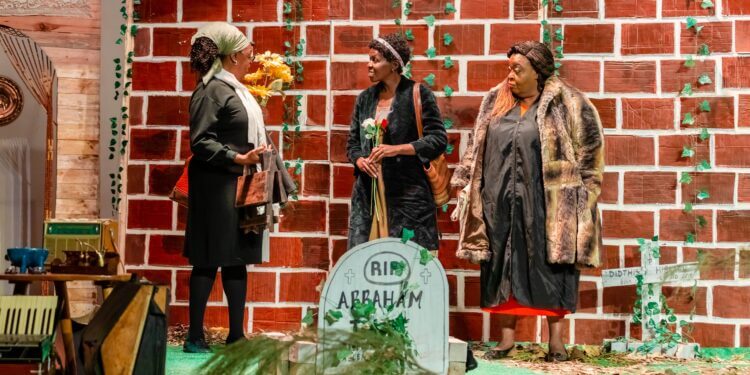Touted as a celebration of legends, the second play by Nyokabi Macharia and Nice Githinji-founded Shorts from Africa introduces Graveyard Queens, a dramatic piece centred around three senior best friends who are reeling and healing in their lives after the deaths of their husbands. Hosted at the Braeside School auditorium, and with only five actors to fill out more than two hours of narrative, Graveyard Queens sets out to redefine the image of commitment, friendship, grief, and love of those entering the twilight of their lives while celebrating the revered actors who get to show their full talent on a script entirely devoted to them and their strengths.
It’s a story of three best friends who have found their rhythm in a world without the company of their life-promised partners, a rhythm that has created a perfect sanctuary to grieve in the company of true friendship while they forge new paths in the life that is still left to be lived. Written with the uttermost care and warmth, the story is paced in perfectly synchronised and elaborate scenes that each hold true to the overarching themes. And the direction by famed actresses Githinji and Nyokabi, whose personalities would seem mismatched to tell such an emotionally poignant story as this, but who steer the narrative with enough flair, comedic tempo, and deep introspection that takes a good story to a whole different level.
Graveyard Queens’ three female leads are on different planes of existence, fully stocked with years of personality refinement and different ways they all choose to deal with their grief. Tabby, as she insists on being called, is enjoying the freedom and monetary incentives she now has after her husband’s passing. On the complete other side, Doris has every intention of spending the rest of her life invested in her knitting and the celebration of the life she got to enjoy. The two string the plot together from both sides, with Tabby bringing a dynamism of eccentricity that creates most of the comedy of the show, while Doris cools everything down and strikes with strictness in pursuit of familiar stability. In the middle and heart of the story, everything converges on Ida. Who’s sitting room becomes the foundational rest for the dueling themes of the show, and her waning restraint to want more finds her in a romantic tangle after a lifetime of settling into the inkling that she’s long past romantic tangles.
On a vibrant and poignantly divided stage, the four legends graced a stage with over a hundred years of experience between them and let it pour out. Muthoni Gathecha (Shimoni) embodies Tabby punch for punch, radiating all the quirkiness and aberrant traits and delivering her stinging and aloof tongue-in-cheek dialogue beautifully for her first excursions on a theatre stage. Muthoni’s talent has clearly grown in prominence over the past couple of years in movies and shows, and I can’t wait until she makes it her stage. Carol Odongo carries her character Ida through her stirred turmoil with the grace and subtlety that stand even after more than a decade-long gap from the last time she took the stage. Mumbi Kaigwa (Country Queen) plays the conservatively reserved Doris, delivering the stern and endearing spirit of an African settled matriarch. She portrays the awkward fragility and motherly feel of her character to the bone. The fourth of the legends and the only man in this play, John Kararahe (A Guide to Dining Out in Nairobi) plays Sam, a man also on his own journey through grief, and without the presence of younger men around, he is forced into the weak and awkward but respectful traits of a man reaching for the attention of a girl he likes, and he plays it well enough that he had the crowd go from audibly saddened for him to uttering hate within minutes. That’s good acting right there. Agnes Kola, playing Christabell, wraps up the cast ensemble, bringing with her even more eccentricity and the confidence and arrogance of youth.
Shorts from Africa has delivered a heartfelt, and resonant tribute, bringing the best of a generation of actors together on one stage to display the weight of talent and experience they have earned over the years, bouncing off them a timely and introspective story that transverses generational gaps to celebrate the beauty and toil of life through the lens of women who are all coming to terms with the absence of their former selves and the presence of each other. It’s a play that I hope to catch a second time before it closes, and one that makes me optimistic for whatever Shorts from Africa have in store next.
Enjoyed this article?
To receive the latest updates from Sinema Focus directly to your inbox, subscribe now.












I like the writing of this but I have alternate thoughts on this show.
Maybe it was the curse of the Saturday afternoon shows… but it fell short of expectations.
I think it would have been helpful for the Shorts from Africa team to acknowledge that this is an adaptation of the play The Cemetery Club. I could see decent efforts to localise it but I think as creatives they would understand why it’s important to credit their fellow creatives work.
I feel like the cast needed a little more direction and not just blocking – I don’t know if it’s because the main cast were older than their directors but I was really struggling with some of the choices made performance wise.
After intermission it felt like they milked their tipsy scene to the point it wasn’t funny anymore. I know as an actor myself when you can feel the show struggling and you try to save it by all means necessary… resulting in cringeworthy moments.
I like that they are different offerings for different crowds but there is always I believe room for improvement